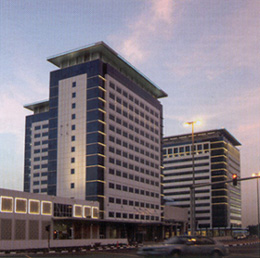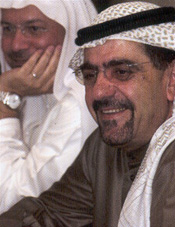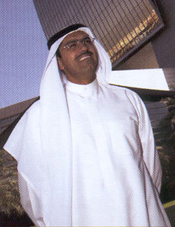
The
new Dubai International Convention
Centre |
The Annual Meetings of the Board of
Governors of the World Bank and
International Monetary Fund will be held
in an Arab country for the first time in
September when Dubai hosts the world’s
biggest financial gathering. Ben Smalley
reports on the city’s preparations for the
meetings and the benefits they are
expected to bring to the region.
Dubai
is gearing up to welcome more than
14,000 delegates attending the Annual
Meetings of the Board of Governors of
the World Bank and International
Monetary Fund (IMF), which are being
held in the city in September.
Among those attending will be the finance
ministers and central bank chiefs from all
184 member countries of the World Bank and
the IMF, as well as senior business and
financial leaders from across the globe.
The world’s biggest financial gathering is
being hosted by an Arab city for the first
time since the annual meetings began in
1946, and local officials are looking
forward to the international exposure it
will bring to Dubai, the UAE and the
region as a whole.
Ibrahim Belsalah, General Coordinator of
Dubai 2003, said: “The Annual Meetings
will enable the policy makers of the world
to witness the true picture of the Middle
East first-hand. This will be a perfect
opportunity for the region to showcase its
economic potential and opportunities for
foreign investment. The Arab world offers
great opportunity for international
investment, yet less than two per cent of
direct foreign investment is made in this
region - and the combined GDP of the Arab
world is currently less than that of
Spain.
“These meetings are an ideal opportunity
to show the world what they are missing –
that the Middle East is a region with
enormous untapped potential for investment
and trade. It has well-developed
infrastructure, modern cities, and an
educated and dedicated workforce which
seeks a larger role in the global
economy.”
The World Bank Group and the International
Monetary Fund have annual joint meetings
of their Boards of Governors in a
three-year cycle. They
are held in Washington for two consecutive
years and in another member country in the
third year. Dubai was selected as the host
country for 2003 and has been preparing
for the event since 1999.
One of the biggest investments has been
the US$175 million (Dh 650 million) Dubai
International Convention Centre, which
will be the venue for the meetings, and
also enable Dubai to market itself as a
future host for similar global
conventions, conferences and international
events.
“The convention centre has been designed
for long-term use to benefit the UAE,”
explained Mubarak bin Fahad, Director
General of the Dubai World Trade Centre,
which manages the facility. “The
multi-purpose hall can be transformed into
a number of different configurations for
different purposes – as well as
conventions and conferences, it can be
used as a 6,000-seat theatre, or can
accommodate 15,000 people standing for
rock concerts and other similar events.
“With many of the world’s business leaders
attending Dubai 2003, they will get the
chance to see this brand new,
state-of-the-art facility for themselves.
They will therefore be aware of its
existence, as well as all the excellent
facilities available in Dubai, when they
come to plan their own international
conferences and conventions. Coupled with
all the other possibilities the facility
offers, we see the convention centre as a
major asset for Dubai and the UAE – and
not just for the short-term.”
The fact that the meetings are being held
in the Middle East for the first time is
reflected in the topics of open seminars
which accompany the closed door sessions
of the annual meetings – with issues such
as women’s rights, nationalisation of
workforces and Islamic banking all on the
agenda.
“It’s a mistake to write this event off as
being about finance alone,” Belselah said.
“This event will impact on all areas of
lifestyle, culture, business and
socio-economic development in the Middle
East and around the world.
“In order to understand what impact these
meetings will have on the world, it is
important to understand the purpose of the
IMF and the World Bank: these two
organisations are dedicated to eradicating
poverty through aid assistance, the
improvement of education and other social
development programmes, as well as
developing stable economies.
“Take health as an example - the World
Bank commits an average of US$1 billion in
new lending each year for health,
nutrition and population projects. And on
education, the World Bank has provided
US$31 billion in loans and credits, and
finances 158 education projects in 83
countries. Meanwhile, more than US$14
billion has been used to fund
environmental projects around the world to
date.
|

Brigadier Abdul Aziz Al Bannai, Head
of Dubai 2003 security committee. |

Ibrahim Belsalah, General
Coordinator of Dubai 2003. |
“Perhaps most pertinent to the Middle
East is the World Bank’s assistance to
countries emerging from conflict, which
covers 40 nations at present, including
Afghanistan. Top of the list is to
assist war-torn populations, resume
peaceful development and prevent a
relapse into violence. On a day-to-day
basis, the Bank’s work addresses a range
of needs including jump-starting
economies, investing in war-affected
regions, repairing war-damaged
infrastructure and targeting programmes
to vulnerable groups such as widows and
children.
“All these projects are of huge interest
to every one of us, and we must do
everything we can to support initiatives
like this. By hosting this event in
September, and by making it as much of a
success as possible, the UAE is playing a
part in the facilitation of global policy
making.”
As well as finance chiefs and business
leaders, representatives from more than 50
Non-Governmental Organisations (NGOs) are
also being invited to attend the meetings
to enable their voices to be heard as part
of the policy-making process, and police
say peaceful demonstrations will be
allowed.
Brigadier Abdul Aziz Mohammed Al Bannai,
Director of the General Department of
Security Establishments and Emergency at
Dubai Police and Head of the Dubai 2003
Security Committee, said: “We are happy
for all people to come to Dubai and
express their opinions and views in a
peaceful and law-abiding manner as the UAE
is a free and open country.”
He said facilities will be made available
to NGO representatives at one of the
colleges and universities in Dubai to hold
meetings and press conferences on the
sidelines of the main meetings, with the
possibility of also holding press
conferences in the Dubai International
Convention Centre itself.
However, Dubai Police are taking no
chances with security and have been
liaising with their counterparts in
Washington and other cities which have
held similar meetings in the past to
prepare for any eventuality, although Al
Bannai said the sort of violent protests
which have been seen at previous meetings,
and most recently at the G8 Summit in
Evian, are not anticipated.
“This is mainly because the culture in the
UAE and Dubai is very different from other
countries where the meetings have been
held,” he said. “The population here
comprises of people and families of
virtually every nationality who live
together in peace and harmony.
“Also, the issues and causes of many of
the demonstrations in previous years –
notably environmental conservation and
poverty alleviation - are also causes of
the UAE. We have a lot of programmes in
the country that address these issues. The
UAE is among the highest contributors of
foreign aid donations to developing
countries – even more than some
‘developed’ countries - and the UAE
contributes more than $2billion annually
in foreign aid to developing countries,
both Islamic and non-Islamic.”
Increased investment in the region and the
strengthening of trade ties are being
cited as the main long-term benefits of
the meetings being held in the UAE, but
there are also immediate benefits
through the direct spending of the massive
influx of visitors – with more than 10,000
hotel rooms in the city block-booked for
the 10 days of the event by the organising
committee.
“In the short-term we estimate there will
be a direct investment boost of $45
million generated through spending on
hotels, restaurants, transportation and
other areas,” Belselah said. “Hundreds of
millions of dollars worth of additional
business is projected to be generated from
the ripple effect of the meetings – repeat
visits, word-of-mouth referrals and
increased global awareness of the UAE and
the region.”
Some 5,000 local people will also be
employed on a temporary basis to work at
the event, including administrators and
secretaries to assist the World Bank and
IMF staff arriving from Washington to
organise the actual meetings themselves,
as well as hosts and guides for the
thousands of delegates who are being
recruited from UAE colleges and
universities.
“The temporary nature of the event makes
it ideal for us to recruit highly
motivated and skilled individuals from the
UAE’s Higher Education sector,” Belselah
said. “They will have the chance to not
only work on the biggest international
event ever to be staged in the UAE, but
also to act as ambassadors for the
dynamism and vision of our country.”
Heading the campaign to enlist students
for the event is the specially-appointed
Dubai 2003 community liaison officer, Sara
Ismail Mohammed, who says over 700
students from different emirates have
already applied to work as part of the
Dubai 2003 team.
“The response from students and professors
alike has been phenomenal, and we expect
the number of students recruited to
support the event to double by the end of
August,” she said. “The students will have
a wide range of roles to fill, from
liaison officers at the airport, hotels
and Dubai International Convention Centre,
right through to tour guides.”
Belselah added that the staging of the
Annual Meetings in the UAE also presents
an ideal opportunity to challenge and
address misconceptions about the region
and show the ‘true face’ of the Middle
East.
“For two weeks Dubai will effectively
become the centre of the world’s financial
sector as we host more than 14,000 of the
world’s most influential people,” he said.
“The eyes of the world will be on us at
this time, and we are looking forward to
demonstrating the realities of the Middle
East as a stable region which has
tremendous untapped potential for
investment and trade, while also enabling
Arab nations to project their
entrepreneurial talents, initiatives and
potential for investment and partnership.
“The meetings will also help dispel any
stereotypical misconceptions that some may
hold about our people and culture. For
example, in relation to women’s rights:
UAE national women outnumber men in our
universities and higher education
institutes, and play a crucial role in our
workforce and the development of our
nation.
“Delegates attending the meetings from all
over the world will see this for
themselves – and they will also see a
modern city on a par with any in the
‘developed world’ where people from all
over the globe live and work together in a
safe, peaceful and productive
environment.”
|
